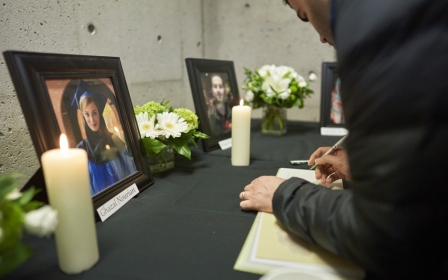Tensions erupt in Canadian city over broadcast of Muslim call to prayer

A decision to allow mosques in a Canadian city to broadcast the Adhan, the Muslim call to prayer, once a day has resulted in threats against the faith group, with far-right activists demanding the decision be reversed.
The City of Mississauga passed a motion last Wednesday to temporarily exempt mosques from a noise bylaw so they can broadcast the Adhan once a day until the end of the Muslim fasting month of Ramadan, which should finish by 23 May.
A condition was that the Adhan did not call on people to congregate in mosques, because places of worship are shut as a part of measures to contain the spread of the coronavirus.
In an attempt to inflame tensions, Faith Goldy, a white nationalist who was barred from Facebook last year, tweeted that the Adhan was a sign of the demographic threat Islam and Muslims pose to Canada.
The motion also prompted a man to trespass and stalk a mosque in Edmonton, and threaten to take part in a "Ramadan Bombathan".
Stay informed with MEE's newsletters
Sign up to get the latest alerts, insights and analysis, starting with Turkey Unpacked
A letter was also placed in three different online petitions calling for the decision to be reversed, arguing that it was a "violation of human rights".
Another open letter was posted on Facebook by Hani Tawfillis, a pharmacist who ran unsuccessfully as a Conservative Party candidate in the last federal election, said that Canadian soldiers who fought in the Middle East would be hurt by hearing the call to prayer, and equating it with slogans used by the Islamic State group.
"Had we thought about our beloved Canadian veterans who fought in Islamic countries such as Afghanistan or Iraq, after hearing some words used by ISIS, which is part of the Adhan that remind them by announcement in these war zones for a call of an attack to be imminent," he wrote. He also stressed that he was not an Islamophobe.
The petitions, placed on both Change.org and the ultraconservative CitizenGo website, have since been removed. Vice News was the first to report about the campaigns.
Change.org told Vice that the campaign was removed because it was "violating hate speech community guidelines". Still, before being removed the online petition gathered about 20,000 signatures.
On Wednesday during a city council meeting, a motion was put forth to reverse the decision, according to local media reports.
The group Canadians United Against Hate called on council members to uphold the original decision and warned against "giving in to hate".
In a letter to the councillors, the group's founder Fareed Khan said the Adhan is an example of "multiculturalism, pluralism and acceptance of diversity in practice. It demonstrates the best of what Canada is about.
"To cave in to pressure from these hateful elements in society is to take a step back and say to all minority communities that hate is stronger than love and acceptance."
Middle East Eye delivers independent and unrivalled coverage and analysis of the Middle East, North Africa and beyond. To learn more about republishing this content and the associated fees, please fill out this form. More about MEE can be found here.





